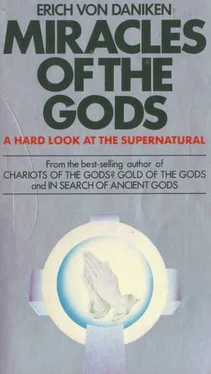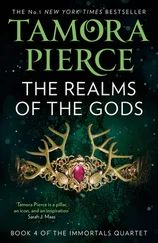Erich Daniken - Miracles of the Gods
Здесь есть возможность читать онлайн «Erich Daniken - Miracles of the Gods» весь текст электронной книги совершенно бесплатно (целиком полную версию без сокращений). В некоторых случаях можно слушать аудио, скачать через торрент в формате fb2 и присутствует краткое содержание. Жанр: Физика, на английском языке. Описание произведения, (предисловие) а так же отзывы посетителей доступны на портале библиотеки ЛибКат.
- Название:Miracles of the Gods
- Автор:
- Жанр:
- Год:неизвестен
- ISBN:нет данных
- Рейтинг книги:4 / 5. Голосов: 1
-
Избранное:Добавить в избранное
- Отзывы:
-
Ваша оценка:
- 80
- 1
- 2
- 3
- 4
- 5
Miracles of the Gods: краткое содержание, описание и аннотация
Предлагаем к чтению аннотацию, описание, краткое содержание или предисловие (зависит от того, что написал сам автор книги «Miracles of the Gods»). Если вы не нашли необходимую информацию о книге — напишите в комментариях, мы постараемся отыскать её.
Miracles of the Gods — читать онлайн бесплатно полную книгу (весь текст) целиком
Ниже представлен текст книги, разбитый по страницам. Система сохранения места последней прочитанной страницы, позволяет с удобством читать онлайн бесплатно книгу «Miracles of the Gods», без необходимости каждый раз заново искать на чём Вы остановились. Поставьте закладку, и сможете в любой момент перейти на страницу, на которой закончили чтение.
Интервал:
Закладка:
After a little while another saw him, and said, Thou art also of them. And Peter said, Man, I am not.
And about the space of one hour after another confidently affirmed, saying, Of a truth this fellow also was with him: for he is a Galilean. And Peter said, Man, I know not what thou sayest ... (Luke 22:54 et seq.)
The fact that Peter was able to stay by the camp fire among the Roman legionaries for at least two hours shows what a cunning fellow he was.
Jesus was brought before two courts, tried, derided, tortured, found guilty and nailed to the cross.
Carmichael [24] has convincingly proved that crucifixion was a Roman method of execution: Roman soldiers carried out the crucifixion according to a Roman judgment. Theologians assume that it happened about the year 32. The inscription on the cross indicates that Jesus was executed for a political crime ... as 'King of the Jews' (John 19:19-22).
To fill out this outline I should add that Jesus was a sensitive learned man, who was skilled in medicine and a talented orator, besides having para-psychological abilities. No one can doubt his absolute honourableness and humble fear of God, in so far as he is rated as a historical personage. As an Essene or someone who knew the rules of their order inside out, he practised the commandments to love one's neighbour, be continent and help others. But since the appearance of the Qumran Scrolls, we know that the defendants of the Essene doctrine were committed opponents of the Romans, for all their love of peace. They wanted to drive the heathen interlopers and their polytheism out of the promised land. Religious and political interests mingled and that was bound to lead to an explosion at some time. Religion and politics have never been a good mixture.
I do not want to take sides in the discussion about whether Jesus, as Augstein suspects, was 'an apparition synthetically woven into one from several figures and currents'.
For, to follow Professor Gunther Bornkamm [25]: 'If we were to reduce tradition critically to what can no longer be doubted on historical grounds, all we would have left would be a torso which had scarcely anything in common with the story testified to in the Gospels.'
Here I am only concerned with establishing that Jesus was a devout man, but not 'God's only begotten son', a political activist, but not a 'Redeemer'. This proved information will give the literally-minded Christian a severe shock, because doubt is a sin 'against the Holy Ghost'. Hundreds of millions of Christians have been kept at a primitive stage of religion for two thousand years by a doctrinal system based on false premises, although well informed theologians could have 'proclaimed' the truth long ago. Yet they have kept silent. Two thousand years of false instruction - that's what I call tradition.
Brought up as a Roman Catholic, I am dealing with the figure of Jesus as we all accepted it in the Christian tradition, even if 'understandably ... (we) are so caught in our own tradition, that we can scarcely approach the Gospels and the New Testament in their totality without prejudice.'
(Carmichael.)
Faith is defined as inner certainty without regard to proof, an instinctive conviction. People appeal to faith, people demand faith from those who do not know. Faith means 'trust'. This appeal, in the sense of belief in a higher power, in the incomprehensibility of 'Be!' and 'Die!', of the beginning and end of all being, is good, necessary and eternal. This faith has given consolation and help, blessing and profit to men in all ages. But such faith has not the remotest connection with religious insistence on being right. With the fanatical orders 'Thou must!', 'Thou shalt!', 'Thou shalt not!', Christian pastors and exegetes plunged into the great endless war of the faith. With their stubborn insistence on being the only preachers of the one true word of God, they made a claim with most unfortunate effects.
On the other hand it is not true as general opponents of the faith say, that 'religion' per se has brought suffering and care on mankind with persecutions, tortures, tears and blood. If believers, egged on by Zealots, had made no image of God there would never have been any religious wars. For religion in the spirit of faith in a creative and ordering power does .not claim to proclaim the ultimate truth, nor does it have multi-purpose bits of advice for sore places, or driveling adages for all occasions.
Even before the Dead Sea Qumran texts, discovered in 1947, forced Christian theologians to admit new material to the discussion, critical matter-of-fact men, who wanted accurate knowledge, had discovered irresolvable contradictions in the New Testament. There could be nothing earth-shaking about that, if it were not God's word or Jesus' word that was supposed to be involved. As father and son are consubstantial (second Council of Constantinople) they are omniscient, infinitely wise, omnipresent, without error - in short, infallible. These are the qualifications of the inspired authors which determined the standard by which the Holy Scriptures are to be judged. Is this high standard justified?
The Gospel according to St. Matthew begins with the family tree of Jesus, the son of David, the son of Abraham. (1)* Ancestors are enumerated until 'Jacob begat Joseph the husband of Mary' (16). What purpose does Joseph serve, since he cannot be the father of Jesus? The fact that his wife was supposed to be pregnant by the Holy Ghost did not satisfy the simple carpenter, who knew perfectly well the normal way of bringing children into being. 'Then Joseph her husband, being a just man, and not willing to make her a public example, was minded to put her away privily' (19). An angel in a dream saved their married happiness: Joseph, thou son of David, fear not to take unto thee Mary thy wife: for that which is conceived in her is of the Holy Ghost' (20). Joseph accepted the apparition's message.
Joseph's ancestry does not really seem to have been as clear as one would have wished and a certain scepticism as to his being the father of Jesus is hinted at in St. Luke: 'And Jesus himself began to be about thirty years of age, being (as was supposed) the son of Joseph, which was the son of Eli' (Luke
3:23). Luke ascribes seventy-six progenitors to Joseph (Matthew only 42). There are obviously considerable difficulties in tracing the family tree down to Joseph.
Modern theologians [26] say that the 'immaculate conception' should not be taken to mean that Joseph had not touched his Mary. Are they twisting the meaning of the words inspired by God, because the whole process is so implausible? Matthew makes it perfectly clear: 'When as his mother Mary was espoused to Joseph, before they came together, she was found to be with child of the Holy Ghost'
(1:18). Nothing could be plainer than that.
Matthew expressly states that John baptized Jesus and how he did it. John knew whom he was dealing with '... He it is, who coming after me is preferred before me, whose shoe's latchet I am not worthy to unloose' (1:27).
'... but he that cometh after me is mightier than I, whose shoes I am not worthy to bear' (3:11). John addressed Jesus directly: 'I have need to be baptized of thee, and comest thou to me?' (3:14). After the baptism the heavens opened and the spirit of God descended 'like a dove' and a voice from heaven said: 'This is my beloved Son, in whom I am well pleased' (3:17). John recognized the man he had baptized, who was even identified by heaven as the Son of God: nothing could be clearer.
----
[*] The figures in brackets refer to the verses quoted from St. Matthew's Gospel.
---- Herod Antipas (4 B.C. to A.D. 40) took John prisoner and even followed his consort's whim when she urged him to have the Baptist beheaded. John suddenly forgot Jesus in prison and sent two disciples to ask him: 'Art thou he that should come, or do we look for another?' (11, 3). The impression that the Nazarene - with all his concentrated charisma - made on John during the baptismal ceremony seemed so lasting that it is difficult to understand his lapse of memory.
Читать дальшеИнтервал:
Закладка:
Похожие книги на «Miracles of the Gods»
Представляем Вашему вниманию похожие книги на «Miracles of the Gods» списком для выбора. Мы отобрали схожую по названию и смыслу литературу в надежде предоставить читателям больше вариантов отыскать новые, интересные, ещё непрочитанные произведения.
Обсуждение, отзывы о книге «Miracles of the Gods» и просто собственные мнения читателей. Оставьте ваши комментарии, напишите, что Вы думаете о произведении, его смысле или главных героях. Укажите что конкретно понравилось, а что нет, и почему Вы так считаете.











